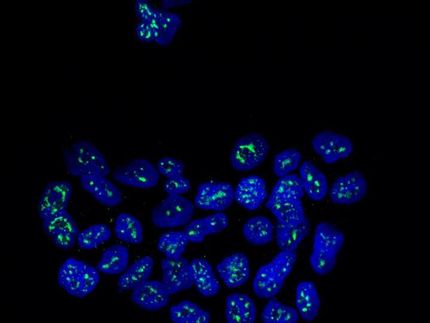CSHL scientists identify new drug target against virulent type of breast cancer
Enzyme target, Brk, is shown to be an accelerator of HER2-positive tumors
Tumor cells in a particular subset of breast cancer patients churn out too much of a protein called ErbB2 - also often called HER2 - which drives the cells to proliferate unchecked. Patients unlucky enough to be in this group - about one in four - have poorer prognoses and clinical outcomes than those who don't.
The drugs Herceptin and Lapatinib, prescribed in combination with other chemotherapeutic agents, have improved this picture significantly, but leave plenty of room for improvement: they suppress ErbB2 but are effective against less than half of ErbB2-producing tumors. Moreover, patients with tumors that do respond usually develop resistance to these drugs.
A team of scientists at Cold Spring Harbor Laboratory has just published research identifying an enzyme called Brk that may serve as a target for future drugs developed to fight ErbB2-positive tumors. Brk, they report, helps these tumors become virulent and is also implicated in the process through which the tumors develop drug resistance.
"The limited success of existing therapy suggested to us that factors besides ErbB2, or proteins that collude with ErbB2, might nullify the effects of Herceptin and Lapatinib," explained CSHL Professor Senthil Muthuswamy, Ph.D., leader of the research team and corresponding author of the paper, published in Proceedings of the National Academy of Sciences.
In the hunt for ErbB2's co-conspirators, Dr. Muthuswamy's team focused on Brk, which they knew to be over-produced in many other types of cancer, including two-thirds of all breast cancers. A detailed analysis of changes that occurred in the genomes of a sample of breast cancer patients helped the group confirm that the expression of ErbB2 and Brk was directly linked.
By forcing the production of both ErbB2 and Brk within the same cell, they determined how Brk enhances ErbB2 activity and fortifies tumor cells against ErbB2-targeting drugs. "Our results might explain why the strategy of using ErbB2 inhibitors alone to treat breast cancers has fallen short," noted Dr. Muthuswamy. "These findings may also suggest a way to treat patients with advanced ErbB2-positive tumors and those who've developed resistance to ErbB2 inhibitors – an idea that we're eager to test."
The team checked breast cancer tissue from more than two hundred patients for variations in the number of copies of both genes and found that they were both amplified abnormally in a significant number of these samples. Re-analyzing the samples for the expression levels of both genes revealed that "co-amplified" genes were also "co-overexpressed" -- they were the source of abnormally high levels of their corresponding proteins.
Further experiments by Muthuswamy's team revealed that although Brk does not induce cancerous proliferation on its own, it enhances the proliferation of cells that also express ErbB2 by speeding up their entry into the cell cycle. Proliferation in cancer is the result of the cell cycle gone out of control - beyond limits that healthy cells impose on their own multiplication. Aside from hurrying along tumor progression, Brk was also found to diminish the effectiveness of ErbB2-inhibiting drugs on tumor growth. This finding reinforces the need for combination therapies.
Original publication: Bin Xiang, Kiranam Chatti, Haoqun Qiu, B. Lakshmi, Alexander Krasnitz, Jim Hicks, Min Yu, W. Todd Miller, and Senthil K. Muthuswamy; "Brk is coamplified with ErbB2 to promote proliferation in breast cancer"; Proceedings of the National Academy of Sciences 2008.
Other news from the department science

Get the life science industry in your inbox
By submitting this form you agree that LUMITOS AG will send you the newsletter(s) selected above by email. Your data will not be passed on to third parties. Your data will be stored and processed in accordance with our data protection regulations. LUMITOS may contact you by email for the purpose of advertising or market and opinion surveys. You can revoke your consent at any time without giving reasons to LUMITOS AG, Ernst-Augustin-Str. 2, 12489 Berlin, Germany or by e-mail at revoke@lumitos.com with effect for the future. In addition, each email contains a link to unsubscribe from the corresponding newsletter.






















































